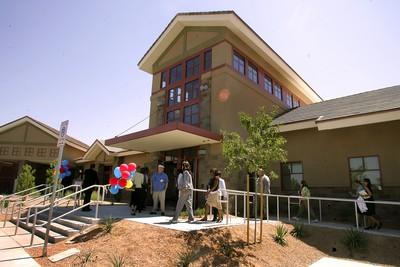Agency reviews LV mental facility

An agency that evaluates the operational practices of health care organizations has noted “serious” concerns at the Rawson-Neal Psychiatric Hospital in Las Vegas.
The Joint Commission, which visited the hospital in April, raised concerns about medical oversight of patients by staff, proper health evaluation of patients and how medical records are kept and maintained, said Mike Wilden, director of the Nevada Department of Health and Human Services.
The Rawson-Neal facility, at Oakey and Jones boulevards, is the in-patient component of Southern Nevada Adult Mental Health Services. It opened last summer and was lauded as a key component in alleviating the psychiatric bed shortage in the Las Vegas Valley.
Wilden declined to be too specific on what the federal agency found, but he did say the issues raised were being taken seriously.
“What mostly concerned me is that we’re focusing on medical issues — making sure proper health care is being given, patients are being evaluated and that information is being documented properly. … Clearly some findings revealed that there was not proper documents in the files about the quantity and quality of health care being provided.”
Char Hill, a spokeswoman for the Joint Commission, the nation’s premier evaluator and accrediting agency of hospitals and other medical care facilities and programs, said the site visit was unannounced. It took place April 23-27.
She said the Joint Commission conducts site visits on a regular basis and in response to complaints. She wouldn’t say whether the visit was the result of a complaint.
The last visit by the Joint Commission was in 2004. At that time, Southern Nevada Adult Mental Health Services received accreditation.
The commission’s visits are typically done every three years, although at the beginning of 2006 the agency was no longer announcing specifically when site visits would occur.
“Our evaluations are on an unannounced basis,” Hill said. “If we learn of something going on in between that time and it warrants an evaluation, a survey team will be sent out.”
Hill said that shortly after an evaluation is completed, findings are posted on the organization’s Web site. The findings are available to hospital officials, and the report details requirements for improvement, if any, Hill said.
If an organization receives requirements for improvement, it is expected to submit evidence of compliance with standards. When compliance has been demonstrated, accreditation is given.
That process, she said, usually takes four months. The findings of the April visit would be made public at that time, Hill said.
During that time, Southern Nevada Adult Mental Health Services, which falls under the umbrella of Wilden’s agency, will continue to be accredited based on its 2004 evaluation.
Wilden said the local agency’s administrative staff is currently working with the Joint Commission to resolve the issues.
“We’re in the corrective action plan process,” Wilden said. “We are currently still certified, and although their official notice to us uses language such as ‘your organization may meet criteria that may warrant a denial,’ we don’t think we’re in danger of that.”
He said the agency had submitted a formal response that should take it out of jeopardy.
At the same time the Joint Commission was making its site visit, Dr. K.C.R. Nair, who was hired in October as medical director of Southern Nevada Adult Mental Health Services, resigned.
Wilden said he does not know whether Nair’s sudden resignation was directly related to the Joint Commission’s visit.
“He resigned and wrote us a letter thanking us for the time served there,” Wilden said. “They (Joint Commission) made some comments about medical and administrative oversight.”
Nair could not be reached for comment.
Wilden said the state is currently searching for Nair’s replacement. In the meantime, the state’s medical director, Dr. David Rosin, will handle Nair’s duties.












